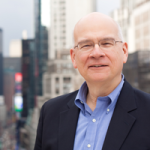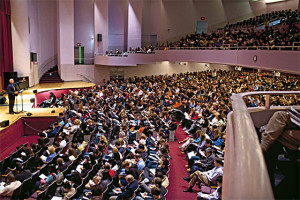Redeemer Presbyterian Church in New York City is one way to picture what the DNA is all about.
In 1997, Scott Allen, Dr. Bob Moffitt and I founded the Disciple Nations Alliance. (To learn more about us, please see this short video.)
The vision of the DNA is to see local churches:
- Practicing sacrificial neighbor-love, meeting physical, spiritual and social needs in their communities
- Functioning intentionally from a biblical worldview, bringing the truth of God’s Word to bear in all areas of public life
- Growing and multiplying as a result of their powerful influence in the community
As this vision increasingly is realized, we desire to see entire communities and nations transformed, places where
- Christ is increasingly acknowledged as Lord over all,
- Biblical reform is occurring in various areas of community life and culture,
- Economic sufficiency, social peace, and greater justice for the weakest and most marginalized are increasing.
For more about this see Disciple Nations Alliance – Our Strategy.
The DNA has influenced churches and movements in 90 countries of the world. People often ask me if there are churches in the United States that live out the kind of things the DNA is advocating. One of the first that comes to mind (even though we have no formal association with it) is Redeemer Presbyterian Church in New York City, pastored by Timothy Keller.
Redeemer Presbyterian … a church engaging its city
This exciting and dynamic church is engaging the city it calls home. Redeemer’s vision statement clearly demonstrates their passion for their city and the world:
As a church of Jesus Christ, Redeemer exists to help build a great city for all people through a movement of the gospel that brings personal conversion, community formation, social justice, and cultural renewal to New York City and, through it, the world.
I recently came across an article by Kate Bachelder titled, “God Isn’t Dead in Gotham.” She tells the story of Redeemer Church and the influence it is having in the city. For those readers not familiar with Redeemer, I thought it would be fun to introduce you.
To read the entire article, scroll to the end of this post. Here are some excerpts.
 “Cheer up, you’re worse than you think,” Rev. Timothy Keller says with a smile. He’s explaining that humans are more weak, more fallen, more warped than they “ever dare admit or even believe.” Then comes the good news: At the same time people are “more loved in Christ and more accepted than they could ever imagine or hope.”
“Cheer up, you’re worse than you think,” Rev. Timothy Keller says with a smile. He’s explaining that humans are more weak, more fallen, more warped than they “ever dare admit or even believe.” Then comes the good news: At the same time people are “more loved in Christ and more accepted than they could ever imagine or hope.”- If there’s no God, he says in sermons, then everything you do at work will be forgotten, and nothing you can do in your career will earn lasting significance. But if Christianity is true, then “every good endeavor,” he likes to say, no matter how small, “can matter forever.” One tough part for people, he says, is coming under “God’s authority,” because “you have to find your identity in Christ, and not in just fulling yourself,” That “completely collides with what the culture is telling people.”
 The skeptics in his audience—about 15% of the people in the audience, he estimates, tell the church they aren’t sure what they believe about Christianity—are often “attracted to the idea of sacrificial love,” he says.
The skeptics in his audience—about 15% of the people in the audience, he estimates, tell the church they aren’t sure what they believe about Christianity—are often “attracted to the idea of sacrificial love,” he says.- Redeemer’s success puts a dent in the narrative that organized religion is on the way out. “Religion is not in decline so much as inherited religion is in decline—religion that you’re born into. So if you’re Swedish, you’re Lutheran, If you’re Polish, you’re Catholic. If you’re Scottish, you’re Presbyterian. If you’re American,” Mr. Keller adds, “You go to the church of your choice; that’s what it means to be an American.” He notes that “evangelicalism fits that quite nicely,” in part because it’s a religion of conversion—of choice.
- He’s cheerful, but the way Mr. Keller describes his own efforts proves what he preaches about the emptiness of seemingly fulfilled ambitions. He admits readily that he can get discouraged, with more ideas and less time. “I very often feel like I’m barely getting a leaf out, in spite of the fact that Redeemer is vastly more successful than I ever thought it would be,” he says.
- “Barely getting a leaf out” is a reference to a short story by J.R.R. Tolkien about a painter named Niggle who spent his whole life trying to paint “a tree, a beautiful tree, and behind it snowcapped mountains, and forest marching off,” Mr. Keller says. When Niggle dies, he’s only finished painting one leaf. “He’s going into the afterlife, and he sees something off in the distance and jumps off the train, runs to the top and there’s the tree, his tree, that he had always felt.”
- What Tolkien is getting across, Mr. Keller says, “is that we have a vision for justice, a vision for beauty—and as artists, lawyers and city planners, in this life we can only ever get out as much as a leaf, but we are actually being inspired by some vision that God’s going to make it a reality.”
– Darrow Miller
Copyright law prevents us from reposting the article in its entirety, and a link here won’t get you through the subscriber firewall. But if you copy the title below and paste it in a search window, the top link in the search results will take you to Ms. Bachelder’s piece at the Wall Street Journal.
God Isn’t Dead in Gotham







